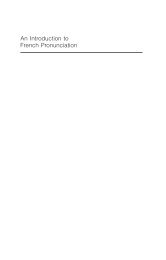English Language Teaching in its Social Context
English Language Teaching in its Social Context
English Language Teaching in its Social Context
Create successful ePaper yourself
Turn your PDF publications into a flip-book with our unique Google optimized e-Paper software.
DO1 N G-E NG LIS H - LESS0 N S 273legitimate and appropriate for discourse <strong>in</strong> official sett<strong>in</strong>gs, and this “<strong>English</strong> = American”symbolic representation has numerous consequences for school<strong>in</strong>g and jobs (Coll<strong>in</strong>s, 1993).For another <strong>in</strong>stance, many Hong Kong parents <strong>in</strong>sist on fight<strong>in</strong>g for a place for their children<strong>in</strong> <strong>English</strong> medium schools (often despite the fact that their children speak and understandlittle <strong>English</strong>) because of the “<strong>English</strong> medium schools = good schools” symbolicrepresentation that they have steadfastly accepted even <strong>in</strong> a largely Ch<strong>in</strong>ese society and apost- 1997 era (for some background to the symbolic dom<strong>in</strong>ation of <strong>English</strong> <strong>in</strong> Hong Kong,see L<strong>in</strong>, 1996, 1998; and more on this <strong>in</strong> section 3 below).Creative, discursive agenyBourdieu has often been accused of be<strong>in</strong>g overly determ<strong>in</strong>istic and a theorist more ofreproduction than transformation (e.g., Jenk<strong>in</strong>s, 1992; Canagarajah <strong>in</strong> Chapter 13). Lcmke,however, po<strong>in</strong>ts out that Bourdieu is not limited to reproduction; what he does limit is theeffectiveness of s<strong>in</strong>gle agents <strong>in</strong> chang<strong>in</strong>g whole fields of valuation (Jay Lemke, personalcommunication). For <strong>in</strong>stance, the legitimate prestige and value attached to <strong>English</strong> <strong>in</strong> HongKong cannot be changed by s<strong>in</strong>gle agents unless there are systematic changes <strong>in</strong> the socialselcction mechanism (e.g., the medium of the universities and the professions; the languageof the job market; see section 3 below). While the above seems true, an area <strong>in</strong> whichBourdieu offers few analyses is the creative, discursive agency of social actors who f<strong>in</strong>dthemselves caught <strong>in</strong> dilemmas. As Coll<strong>in</strong>s po<strong>in</strong>ts out:we need to allow for dilemmas and <strong>in</strong>tractable oppositions; for divided consciousness,not just dom<strong>in</strong>ated m<strong>in</strong>ds; . . . for creative, discursive agency <strong>in</strong> conditionsprestructured, to be sure, but also fissured <strong>in</strong> unpredictable and dynamic ways.(Coll<strong>in</strong>s, 1993: 134)In section 4 below, we shall see some cxamples, and discuss the consequences, of teachers’and students’ different creative discursive strategies <strong>in</strong> response to the classroom dilemmasposed by the larger social structures. However, before look<strong>in</strong>g at the classrooms, let us firstlook at the larger social context of the classrooms.3 Hong Kong: the sett<strong>in</strong>g of the storyDespite <strong>its</strong> <strong>in</strong>ternational cosmopolitan appearance Hong Kong is ethnically ratherhomogcneous. About 97% of <strong>its</strong> population is ethnic Ch<strong>in</strong>ese, and Cantonese is the mothertongue of the majority. <strong>English</strong> native speakers account for not more than 3% of the entircpopulation.They constituted the privileged class ofthe society until July 1, 1997 when HongKong’s sovereignty was returned to Ch<strong>in</strong>a and Hong Kong became a Special Adm<strong>in</strong>istrativcRegion (SAR) of Ch<strong>in</strong>a.The <strong>English</strong>-conversant bil<strong>in</strong>gual Ch<strong>in</strong>ese middle class has, howcvcr,rema<strong>in</strong>ed the socioeconomically dom<strong>in</strong>ant group <strong>in</strong> Hong Kong.Notwithstand<strong>in</strong>g <strong>its</strong> be<strong>in</strong>g the mother tongue of only a m<strong>in</strong>ority, <strong>English</strong> has been thclanguage of educational and socioeconomic advancement; that is, the dom<strong>in</strong>ant symbolicresource <strong>in</strong> the symbolic market (Bourdieu, 1991) <strong>in</strong> Hong Kong. Even <strong>in</strong> the post-1997/colonial era, <strong>English</strong> has rema<strong>in</strong>ed a socioeconomically dom<strong>in</strong>ant language <strong>in</strong> HongKong society. For <strong>in</strong>stance, a 1998 survey on bus<strong>in</strong>ess corporations <strong>in</strong> Hong Kong foundthat the majority of bus<strong>in</strong>ess corporations said they would prefer employees with a goodcommand of <strong>English</strong> to cmployees with a good command of Ch<strong>in</strong>ese (S<strong>in</strong>g Tao Jih Puo, May












